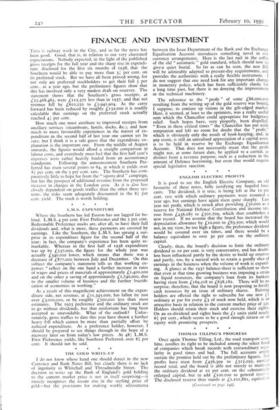THE GOLD WRITE-UP
I do not know whose hand one should detect in the new Currency and Bank Notes Bill, but clearly there is no lack of ingenuity in Whitehall and Threadneedle Street. The decision to write up the Bank of England's gold holding to the current market price is not in itself surprising—it meruly recognises the recent rise in the sterling price of gold—but the provisions for making weekly adjustments between the Issue Department of the Bank and the Exchange Equalisation Account introduces something novel in our currency arrangements. Here is the last nail in the coffin of the old " automatic " gold standard, which should now IN: give n quiet burial. So far as can be seen, the new Bill will be admirably adapted to present-day requirements, and provides the authorities with a really flexible instrument. I do not suggest that one need look for any important change in monetary policy, which has been sufficiently elastic for a long time past, but there is no denying the improvement in the technical machinery.
The reference to the " profit " of some £86,000,000 resulting from the writing up of the gold reserve was bound, I suppose, to conjure up visions in the gilt-edged market. Here, it seemed, at least to the optimists, was a really useful sum which the Chancellor could appropriate for budgetary relief. Such hopes have, very properly, been dispelled. "Even in these critical times" the Chancellor has put aside temptation and left no room for doubt that the "profit," which is obviously only the result of book-keeping, and, in any event, is still an unrealised appreciation of a capital asset, is to be held in reserve by the Exchange Equalisation Account. That does not necessarily mean that the profit might not, at some future date, be applied to a capital, as distinct from a revenue purpose, such as a reduction in the amount of Defence borrowing, but even that would require special legislative sanction.














































 Previous page
Previous page